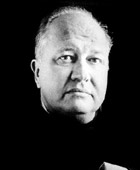Theodore Huebner Roethke was born in Saginaw, Michigan, the son of Otto Roethke and Helen Huebner, who, along with an uncle owned a local greenhouse. As a child, he spent much time in the greenhouse observing nature. Roethke grew up in Saginaw, attending Aurthur Hill High School, where he gave a speech on the Junior Red Cross that was published in twenty six different languages. In 1923 his father died of cancer, an event that would forever shape his creative and artistic outlooks. From 1925 to 1929 Roethke attended the University of Michigan at Ann Arbor, graduating magna cum laude. Despite his family’s wish that he pursue a legal career, he quit law school after one semester. From there he spent 1929 to 1931, taking graduate courses at the University of Michigan and later the Harvard Graduate School. There he met and worked with fellow poet Robert Hillyer.
When the Great Depression hit Roethke had no choice but to leave Harvard. He began to teach at Lafayette College, and stayed there from 1931 to 1935. It was here where Roethke began his first book, Open House. At Lafayette he met Stanley Kunitz, who later in life, became a great support and friend. By the end of 1935 Roethke was teaching at Michigan State College at Lansing. His career there, however, did not last long. Roethke was hospitalized for what would prove to be a bout of mental illness, which would prove to be reoccurring. However the depression, as Roethke found, was useful for writing, as it allowed him to explore a different mindset.
By the time he was teaching at Michigan State Roethke’s reputation as a poet had been established. In 1936 he moved his teaching career to Pennsylvania State University, where he taught seven years. During his time there he was published in such prestigious journals as Poetry, the New Republic, the Saturday Review, and Sewanee Review. His first volume of verse, Open House, was finally published and released in 1941. Open House was favorably reviewed in the New Yorke, the Saturday Review, the Kenyon Review, and the Atlantic; W. H. Auden called it "completely successful." His first work shows the influence of poetic models such as John Donne, William Blake, Léonie Adams, Louise Bogan, Emily Dickinson, Rolfe Humphries, Stanley Kunitz, and Elinor Wylie, writers whose verse had shaped the poet's early imagination and style.
In 1942 Harvard asked Roethke to deliver on of their prestigious Morris Gray lectures. Then in 1943 he left Penn State to teach at Bennington College, where he met Kenneth Burke, whom he collaborated with. The second volume of Roethke's career, The Lost Son and Other Poems was published in 1948 and included the. greenhouse poems. Roethke described the glasshouse, in An American Poet Introduces Himself and His Poems in a BBC broadcast, on the 30th of July 1953, as "both heaven and hell.... It was a universe, several worlds, which, even as a child, one worried about, and struggled to keep alive."
He penned Open Letter in 1950, and explored eroticism and sexuality with I Need, I Need, Give Way, Ye Gates, Sensibility! O La!, and O Lull Me, Lull Me. He later wrote Praise to the End! in 1951 while at Washington University, and a telling Yale Review essay, How to Write Like Somebody Else in 1959. Roethke was awarded Guggenheim Fellowship in 1950, the Poetry magazine Levinson Prize in 1951, and major grants from the Ford Foundation and the National Institute of Arts and Letters the year after. In 1953 Roethke married Beatrice O'Connell, whom he had met during his earlier at Bennington. The two spent the following spring honeymooning at W. H. Auden's villa at off the coast of Italy. There Roethke began editing the galley proofs for The Waking: Poems 1933-1953 which was published later that same year, and won the Pulitzer Prize the next year. It included major works such as Elegy for Jane and Four for Sir John Davies, which was modeled on Davies's metaphysical poem Orchestra.
During 1955 and 1956 the Roethke and his new wife traveled Europe, on a Fulbright grant. The following year he published a collection of works that included forty-three new poems entitled Words for the Wind, winning the Bollingen Prize, the National Book Award, the Edna St. Vincent Millay Prize, the Longview Foundation Award, and the Pacific Northwest Writer's Award for it. The new poems included his famous I Knew a Woman, and Dying Man. Roethke began a series of reading tours in New York and Europe, underwritten by another Ford Foundation grant.
While visiting with friends at Bainbridge Island in 1963, Washington, Roethke suffered a fatal heart attack. During the last years of his life be had composed the sixty-one new poems that were published posthumously in The Far Field in 1964--which received the National Book Award--and in The Collected Poems in 1966. |






